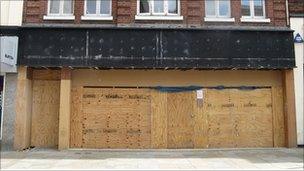Insolvencies set 'to rise by 10%' in 2011
- Published

Small retailers will come under increasing pressure this year, the report forecasts
More UK firms are experiencing serious financial difficulties than at any time in almost two years, research suggests.
Almost 148,000 firms had serious problems in the final three months of last year, the first year-on-year rise in the past seven quarters, said insolvency specialist Begbies Traynor.
Government cuts were exacerbating the problem, it said.
The report forecast a 10% rise in insolvencies in 2011, which would lead to 23,500 firms being affected.
Compared with the July to September quarter, there was an increase of 20% in the number of companies experiencing "significant" or "critical" financial problems.
There were "real signs of distress" among UK firms, it said.
Those with critical problems owe more than £52.7bn to creditors and suppliers, Begbies said. This is less than the £57.5bn owed during the previous quarter.
There were also increasing signs that creditors are losing patience with their debtors, the firm added.
'Corporate failures'
Government spending cuts explained in part the increase in financial distress being felt by UK companies, the report said.
The IT, business services and construction sectors in particular were feeling the pinch, it found.
"The figures demonstrate that the sectors most reliant on government spending are already feeling the impact of public sector cuts," said Ric Traynor, chairman of Begbies Traynor.
"With the full implementation of budget cuts only starting to show through in these figures, public sector-exposed sectors are likely to face significant increases in the level of corporate failures over the course of 2011."
He added that retail firms would come under increased pressure as disposable incomes were hit by higher inflation, tax rises and job cuts.
Sectors exposed to discretionary spending would, therefore, see "an increase in business failures", he added.
Figures released last week showed that inflation, as measured by the Consumer Price Index, rose to 3.7% in December from 3.3% the previous month.
The Retail Price Index, which includes mortgage interest payments, rose to 4.8% from 4.7%.
Also last week, figures showed that UK unemployment rose by 49,000 to almost 2.5 million in the three months to the end of November.
And while the most recent official figures showed that the economy grew by 0.7% between July and September last year, many analysts expect the figures for the final quarter of 2010 to show a slowdown in growth.
Across all sectors, increasing financial distress was likely to lead to about 23,500 formal insolvencies in 2011, a 10% increase on the 21,500 firms that went insolvent last year, Begbies forecast.
In 2010 there were 15% fewer insolvencies that in 2009.
"For smaller businesses, we are entering the darkest hour before the dawn, as they face the dual challenges of weak domestic demand and greater pressure from larger competitors and business customers looking to preserve their own profitability," said Mr Traynor.